|
|
|
Sort Order |
|
|
|
Items / Page
|
|
|
|
|
|
|
| Srl | Item |
| 1 |
ID:
117107


|
|
|
| 2 |
ID:
138188
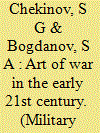

|
|
|
|
|
| Summary/Abstract |
The authors analyze the content of military art at the start of the 21st century and outline the chief issues and trends in the evolution of military art.
|
|
|
|
|
|
|
|
|
|
|
|
|
|
|
|
| 3 |
ID:
191955
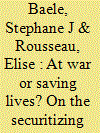

|
|
|
|
|
| Summary/Abstract |
This paper offers a multi-dimensional analysis of the ways and extent to which the US president and UK prime minister have securitized the Covid-19 pandemic in their public speeches. This assessment rests on, and illustrates the merits of, both an overdue theoretical consolidation of Securitization Theory’s (ST) conceptualization of securitizing language, and a new methodological blueprint for the study of ‘securitizing semantic repertoire’. Comparing and contrasting the two leaders’ respective securitizing semantic repertoires adopted in the early months of the coronavirus outbreak shows that securitizing language, while very limited, has been more intense in the UK, whose repertoire was structured by a biopolitical imperative to ‘save lives’ in contrast to the US repertoire centred on the ‘war’ metaphor.
|
|
|
|
|
|
|
|
|
|
|
|
|
|
|
|
| 4 |
ID:
130659
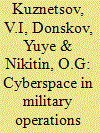

|
|
|
|
|
| Publication |
2014.
|
| Summary/Abstract |
The authors examine the relationship between battlespace, cyberspace, and information environment from the perspective of combat actions conducted by tactical military formations in our day.
|
|
|
|
|
|
|
|
|
|
|
|
|
|
|
|
| 5 |
ID:
111958
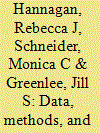

|
|
|
|
|
| Publication |
2012.
|
| Summary/Abstract |
Within the subfields of political psychology and the study of gender, the introduction of new data collection efforts, methodologies, and theoretical approaches are transforming our understandings of these two fields and the places at which they intersect. In this article we present an overview of the research that was presented at a National Science Foundation (NSF) (#SES-1014854) funded conference "New Research on Gender in Political Psychology" at Rutgers University in March 2011. This scholarship represents the expanding questions and approaches that enhance our understanding of gender within political psychology. As a result, we suggest that further innovation is needed with regard to theory and methods to understand better how gender shapes the political attitudes and actions of individuals. Our discussion here covers the use of data, interdisciplinary methods, and intersectionality to study gender. We conclude with thoughts about the theoretical implications of this recent scholarship and the future of political science research on gender.
|
|
|
|
|
|
|
|
|
|
|
|
|
|
|
|
| 6 |
ID:
084267
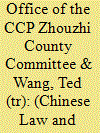

|
|
|
| 7 |
ID:
140564
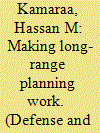

|
|
|
|
|
| Summary/Abstract |
The extensive timespan of evolving assumptions about future adversaries, US military engagements, and technology inherent in the US Army's 30-year modernization strategy can overwhelm the management capacity of planners, and misdirect acquisition investments. Some military scholars have argued that long-range planning is futile due to the complexities of the global security environment. So how can the US Army manage the evolving assumptions inherent in its 30-year modernization strategy to ensure it remains a superior global force? This study will answer the above question by arguing that the US Army's 30-year modernization strategy, while emulative of a similar modernization approach in the threat-based planning environment of the Cold War, is viable if supported by a method and a tool that manage investments and planning assumptions.
|
|
|
|
|
|
|
|
|
|
|
|
|
|
|
|
| 8 |
ID:
124817
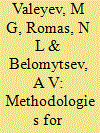

|
|
|
|
|
| Publication |
2013.
|
| Summary/Abstract |
The authors set out their broad idea of "form of military (combat) actions" as a category, its substance and significance for the theory and practice of military art and weapons development, and offer their methodology for defining forms in which troops are employed in different conditions.
|
|
|
|
|
|
|
|
|
|
|
|
|
|
|
|
| 9 |
ID:
148130
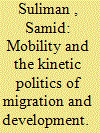

|
|
|
|
|
| Summary/Abstract |
The basic claim of this article is that when the ‘migration-development nexus’ is conceived through a ‘mobilities’ lens, a different account of politics is possible. I refer to this different account of politics as ‘kinetic politics’, to denote that polity formations and political relations are not spatially determined (that is, by processes of boundary formation and relations that travel across these boundaries), but are constituted through movement as people come and go. I argue for a methodological reorientation towards understanding the kinetic politics of development, in order to apprehend the ways in which migrants and migrancy are implicated in the constitution of the polities through which ‘development’ is organised. The recognition of movement as a transversal political relation that cuts across territorial boundaries has implications for the ways in which development is analysed and pursued. I propose that this line of inquiry opens up space to think critically about whether or not formal political membership will remain tethered to problematic territorial and technocratic approaches to ‘sustainable’ development. Might there be space for thinking about migrancy as the basis for rights, and political community as inherently kinetic?
|
|
|
|
|
|
|
|
|
|
|
|
|
|
|
|
| 10 |
ID:
117104
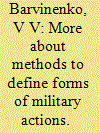

|
|
|
| 11 |
ID:
084276
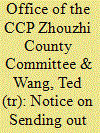

|
|
|
| 12 |
ID:
100046
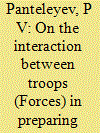

|
|
|
| 13 |
ID:
169942
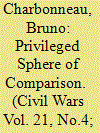

|
|
|
|
|
| Summary/Abstract |
Comparison is a method that cannot avoid that its concepts are approximations made for specific audiences or purposes. Deployed to compare armed conflicts, it naturalises the state as the central unit of analysis and the intervention as the external context. This article proposes a strategy that reveals the colonial legacies that form or perform the units of analysis. The possibility of comparing Côte d’Ivoire and Mali appears only when one considers a prior comparison: between Francophone Africa and other ‘worlds’. The construction of a French privileged sphere of intervention is inextricably tied to establishing a privileged sphere of comparison.
|
|
|
|
|
|
|
|
|
|
|
|
|
|
|
|
| 14 |
ID:
182939
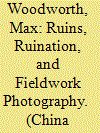

|
|
|
|
|
| Summary/Abstract |
This article offers a self-reflexive critique of ruins as method by examining side-by-side the production, circulation, and meaning-making processes around the ruin photography of ghost cities in China and the author’s own production of a fieldwork archive of the same photographed spaces. The ruin is commonly understood in recent scholarship to be a deeply ideological artefact with meanings contingent on class-inflected practices of ruin appreciation. In a similar vein, photography of urban ruins has been heavily criticised for allegedly aestheticising social ruin and economic decline. The critique of ruin photography as a practice of ideological claim-making or as a form of critical engagement merits scrutiny in light of this issue’s field research practices looking at ruins in China. More specifically, photography is a standard part of fieldwork, including the author’s. The aim of this article, then, is to ask how and why photographs of urban ruins in China differ across image-making practices? How are fieldwork photos of ruins, the kinds of photos that generate a data archive and are used in scholarly publications, resonant with other ideological claim-making purposes of ruin photography? How might we account for the political valences of image aesthetics when photographs are a vital part of scholarly efforts?
|
|
|
|
|
|
|
|
|
|
|
|
|
|
|
|
| 15 |
ID:
125050
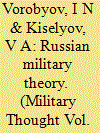

|
|
|
|
|
| Publication |
2013.
|
| Summary/Abstract |
The paper traces the formation of the Russian military theory, and highlights the problems of its development that occurred at various times, including at the present stage.
|
|
|
|
|
|
|
|
|
|
|
|
|
|
|
|
| 16 |
ID:
160886
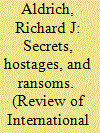

|
|
|
|
|
| Summary/Abstract |
Britain has long taken a firm public line against terrorist ransom, insisting that yielding to terrorist demands only encourages further acts of intimidation and kidnapping. Hitherto, academic research has tended to take these assertions of piety at face value. This article uses a historical approach to show that the British position has shifted over time and was often more complex and pragmatic. Indeed, Britain’s position with regard to kidnap and ransom insurance has, until quite recently, been rather ambiguous. We use the British case to suggest that, rather than dividing states into groups that make concessions and those that do not, it is perhaps better to recognise there is often a broad spectrum of positions, sometimes held by different parts of the same government, together with the private security companies that move in the shadows on their behalf. One of the few things that unites them is a tendency to dissemble and this presents some intriguing methods problems for researchers.
|
|
|
|
|
|
|
|
|
|
|
|
|
|
|
|
| 17 |
ID:
151001
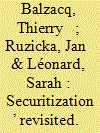

|
|
|
|
|
| Summary/Abstract |
Securitization theory seeks to explain the politics through which (1) the security character of public problems is established, (2) the social commitments resulting from the collective acceptance that a phenomenon is a threat are fixed and (3) the possibility of a particular policy is created. In the last decade, research on securitization has grown significantly. The aim of this article is to evaluate the achievements of securitization theory. First, its main concepts and premises are critically discussed. This article then proceeds to examine the empirical applications of securitization theory to a broad range of issues, as well as the theoretical implications of these studies. Finally, it discusses the main challenges faced by securitization scholars and puts forward strategies to overcome them. This article develops three inter-related arguments. First, notably thanks to empirical studies, securitization theory has significantly developed beyond its initial focus on the speech act. Second, as a result, the distinctiveness of securitization theory currently lies in its capacity to articulate a specific approach to security – influenced by the speech act – with an ‘analytics of government’, which emphasizes practices and processes. Third, securitization theory faces three types of challenges, related, respectively, to theory, method and methodology. The capacity of scholars to overcome those will strongly influence the extent to which securitization theory will be able to make significant contributions to the debates in Security Studies and International Relations in the years to come.
|
|
|
|
|
|
|
|
|
|
|
|
|
|
|
|
| 18 |
ID:
139417
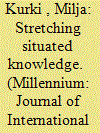

|
|
|
|
|
| Summary/Abstract |
This article is driven by the belief that there is great potential benefit in carefully considering the implications of ‘situated knowledge’ in IR scholarship. This can be helpful not just for scholars thinking through meta-theoretical puzzles in International Relations (IR), but also for shaping concrete knowledge practices in international political practice today. Yet, there seems to be something of an unresolved puzzle at the heart of the situated knowledge paradigm: a puzzle relating to what the situatedness of knowledge entails and how we should ‘deal with it’. This piece suggests that philosophical and social theoretical, and by extension also IR theoretical, engagements with situated knowledge can benefit from being considered anew: from the point of view of theoretical physicists and cosmologists. While not always reflexive concerning ‘social’ situatedness, the physicists and cosmologists considered here have reflected on aspects of situatedness that have been under-emphasised in standpoint philosophy. Crucially, physics and cosmology framings of situated knowledge can help to show why dealing with situated knowledge should mean more than attentiveness to various knowers and their positionality, and more than reflexive ‘dialogue’ between knowers; it also seems to require ‘stretching beyond’ the horizons of ‘situated knowers’. It is suggested that science is, and perhaps even ‘scientifically aspirant’ IR then should be, about imaginative conceptual ‘stretching’ rather than merely ‘situating’. This stretching should go hand in hand with opportunistic but critical methodological probing, seeking to push us ‘beyond’ how we understand the world from our situated perspectives. The provocations developed here have three main audiences in IR: scholars engaged in meta-theoretical debates in IR, those studying international politics through the situated knowledge approach, and also critical theorists seeking to understand conditions of critique.
|
|
|
|
|
|
|
|
|
|
|
|
|
|
|
|
| 19 |
ID:
180189
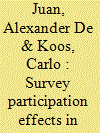

|
|
|
|
|
| Summary/Abstract |
Do survey participants in conflict zones respond differently if they have been interviewed before? Academic and policy interest in postwar political opinion has increased tremendously. One unexpected consequence of this surge of survey research is a growing probability that individuals will be interviewed multiple times. However, if participating in one survey causes respondents to change their attitudes or behavior, their subsequent survey responses may be biased in comparison to the rest of the sample population. Our article aims to investigate such ‘survey participation effects’ in conflict contexts. We draw on original survey data collected in the eastern Democratic Republic of Congo (DRC). In our representative sample, 18% of respondents report that they have been interviewed before. Multivariate analyses demonstrate that their stated attitudes on social relations, political institutions, gender norms, and wartime victimization differ substantively from the responses of first-time interviewees. Moreover, our analyses indicate that experienced respondents have specific response styles – in particular, a tendency to support extreme response options. While substantive bias in multivariate analyses seems to be rather rare, our findings indicate that researchers should be aware of the footprints of data collection efforts in areas frequently targeted by household and opinion surveys.
|
|
|
|
|
|
|
|
|
|
|
|
|
|
|
|
| 20 |
ID:
098745
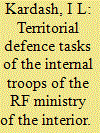

|
|
|
|
|
|
|
|